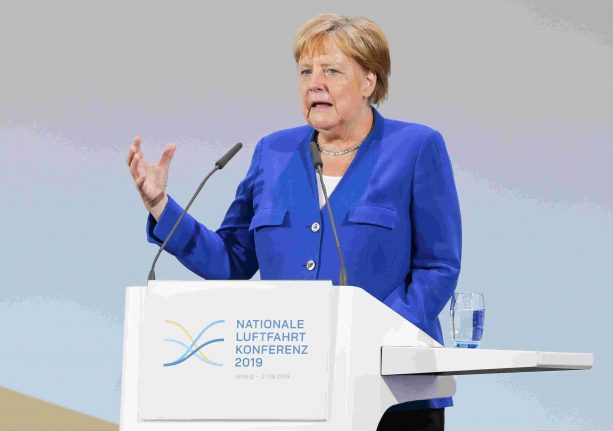“The economic sky is not cloudless”, and global tensions and Britain's impending departure from the European Union “are already causing us headaches”, Merkel told an aviation industry conference.
“That's why I will talk with the British prime minister, who is visiting me today, about how we can avoid friction as much as possible as Britain exits the EU because we have to struggle to achieve economic growth,” the leader of the bloc's biggest economy added.

Merkel speaking to eager onlookers at a conference at Leipzig's Airport on Wednesday. Photo: DPA
A hard Brexit would cost the EU 1.7 million jobs, nearly 300,000 of which would be in Germany, according to a new study published by the University of Leuven in Belgium.
Merkel's spokesman Steffen Seibert stressed that an orderly Brexit would be “in every respect preferable” to a disorderly withdrawal of Britain, but that Germany was also preparing for the worst-case scenario.
Johnson, in a “do-or-die” gamble, has insisted Britain will leave the EU on October 31st, no matter whether it has ironed out remaining differences with the bloc or not, at the risk of economic turmoil.
Johnson told Merkel on Wednesday that the UK “cannot accept” the current terms of their Brexit deal to leave the European Union.
“Clearly we cannot accept the current withdrawal agreement, arrangements which either divide the UK or lock us into the regulatory and trading arrangements of the EU… without the UK having any say on those matters,” he said in Berlin.
Johnson is seeking to convince Merkel, and then French President Emmanuel
Macron whom he visits Thursday, to renegotiate elements of the UK's impending
divorce from the bloc, including the so-called Ireland backstop plan —
something the EU leaders had already ruled out.
“So we need that backstop removed, but if we can do that I am absolutely
sure we can move forward together,” Johnson told reporters.
He hopes that the other 27 EU members will blink and make concessions to avoid a no-deal Brexit that would hurt people and companies on both sides of the Channel.
Ahead of his Berlin visit, Johnson reaffirmed in a tweet that “we're going to leave the EU on October 31st and make this country the best in the world to live in”, the message adorned with a Union Jack flag.
We’re going to leave the EU on October 31st and make this country the best in the world to live in ?? pic.twitter.com/OzLAMo3zDM
— Boris Johnson (@BorisJohnson) August 21, 2019
'Practical arrangement'
In Berlin, Johnson was to be received with military honours before his talks with Merkel, then head to France for a meeting with Macron on Thursday.
At the weekend, all three will meet US President Donald Trump, a vocal supporter of Brexit and its champion Johnson, and the leaders of Canada, Italy and Japan at a G7 summit in the French seaside resort of Biarritz.
Johnson's tough stance has put him on a collision course with EU leaders who have insisted the withdrawal deal agreed under his predecessor Theresa May is final and stressed the need for unity among the other 27 nations.
EU Council President Donald Tusk and Irish Prime Minister Leo Varadkar said the bloc would not cave in to Johnson's demand to scrap the backstop plan, which would keep Britain in the European customs union if no trade deal is signed.
Johnson has slammed the backstop as “undemocratic” and charged it would prevent Britain from pursuing a trade policy independent of EU rules.
Berenberg Bank senior economist Kallum Pickering predicted that “if Johnson hopes to persuade Merkel and Macron to sweet-talk Varadkar into changing his tune, he will likely be disappointed”.
“All of the EU's actions so far since the Brexit vote demonstrate that the EU's priority is the cohesion of the 27.”
Merkel struck a cautiously hopeful note on Tuesday, declaring that the EU was open to “a practical arrangement” for the Irish border if it ensured trade and peace under the Good Friday Agreement.
'Hot air'
Given the shock and dismay Brexit has sparked in continental Europe, its vocal champion, the flamboyant former London mayor and ex-foreign minister Johnson, is sure to meet political headwinds.
German media regularly characterizes Johnson as a reckless political showman with Trump-style populist tendencies.
News magazine Der Spiegel recently caricatured him as the tooth-gapped cover boy Alfred E. Neuman of the American humour magazine Mad, with the headline “Mad in England”.
Latest Der Spiegel: Boris Johnson drawn as Alfred E Neuman. Says it all really. pic.twitter.com/FD3ZU9C4K8
— Juliette Elfick (@SzelingGood) July 22, 2019
Tabloid-style Bild daily nominated Johnson as its “loser of the day” Wednesday after he “hit a brick wall” in his attempts to convince Merkel and Tusk to renegotiate parts of the withdrawal agreement.
The conservative Frankfurter Allgemeine Zeitung judged that “Johnson knows that the other 27 EU members will not throw Ireland under a bus, nor will they do anything to harm the integrity of the single market.
“His 'alternative arrangements' are just hot air. May spent the last three years looking for alternatives. There are none!”



 Please whitelist us to continue reading.
Please whitelist us to continue reading.
Member comments